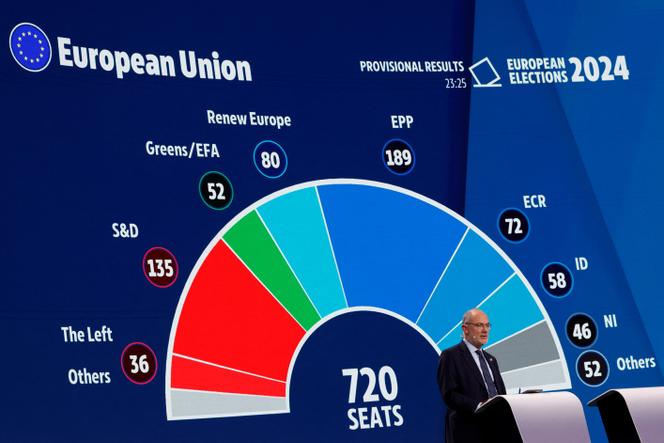


Ursula von der Leyen made no secret of her satisfaction on Sunday, June 9, when the results of the European elections across the continent were announced. "The EPP is the strongest political group in the European Parliament," said the president of the European Commission, referring to her European People's Party (EPP), which is looking to have her reappointed for a new five-year term. "We will build a bastion against the extremes from the left and from the right. We will stop them," she continued, without saying more about how she intends to do that.
The results, albeit incomplete, are unambiguous. The EPP's conservatives confirmed their position as the leading political group in the Parliament, while the far-right made a breakthrough. The Social Democrats (S&D), the second largest group in Parliament, lost ground, but it was above all the liberals of Renew and the Greens who fell back.
The Christian-democratic right-wing of the EPP emerged strengthened from the ballot, which saw citizen turnout rise slightly to 51%, compared with just over 50% in 2019. "We won," rejoiced EPP president Manfred Weber on Sunday evening. "After losing seats in 2009, 2014 and 2019, the EPP regained elected representatives in 2024," he added.
The group was already certain of having 184 representatives out of the 720 newly-elected MEPs by Sunday evening, and was hoping to increase its numbers by welcoming new parties into the fold, such as Hungary's Tisza ("respect and freedom") – the party of Péter Magyar, which has put Prime Minister Viktor Orban in a difficult position – as well as the Farmer-Citizen Movement (BBB) from the Netherlands and the Liberal Alliance and Denmark.

The far right has largely improved its score and it is, after the EPP, the big winner of this election. In France, the Rassemblement National (RN) came out on top. With its historic score, it will send a delegation of around 30 members to the European Parliament for the first time. In Italy, Fratelli d'Italia – the post-fascist party of Prime Minister Giorgia Meloni – is also set to secure a hefty contingent of 24 members, while Matteo Salvini's Northern League could still count seven. In Austria, the Freedom Party (FPÖ) edged out the conservative People's Party (ÖVP) and the Social Democrats (SPÖ).
The far right also came second in several other member states. In Germany, the Alternative for Germany (AfD) came in ahead of the ruling Social Democratic Party (SPD), and likewise in Poland with the Law and Justice Party (PiS). In the Netherlands, Geert Wilders' Party for Freedom (PVV), with six elected members, came in behind the coalition of Socialists and Greens. Several countries will be sending nationalist MEPs to Strasbourg for the first time, like Portugal.
You have 70.78% of this article left to read. The rest is for subscribers only.
